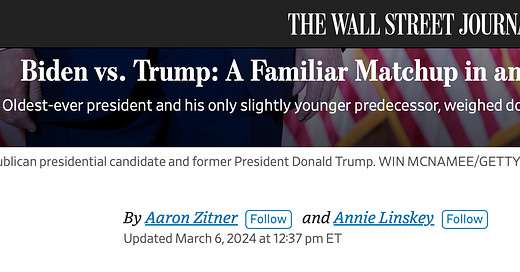Back in fifth grade, the teacher assigned a US president to each student, asking us to write a report on their accomplishments and the significance of their administrations. I was jealous of the girl who got Lincoln, the boy who got Teddy, the nerdy guy who got FDR.
I got Benjamin Harrison. I don’t remember failing the assignment, but I do remember being bewildered by what I read. Or didn’t read. There was no there there. To this day, I couldn’t tell you anything about what he did, or even what he looked like. His name inspires no grandeur: Benjamin Harrison sounds like an insurance agent, a small business banker, or a friend you lost touch with.
I couldn’t tell you what happened in his administration that you might think of as unprecedented. But things that are unprecedented seem to be of great importance to us, especially lately.
Leaving the specifics of this weird, geriatric marathon of the 2024 election season aside, this recent WSJ article “Biden vs. Trump: A Familiar Matchup in an Unprecedented Election,” is another in the endless procession of people overusing the word “unprecedented.”
In trying to understand why everyone keeps talking about various events as without historical analogue, I went to Google trends. It turns out that the use of unprecedented is, well, unprecedented.
The spikes in activity are fairly predictable. December 2016 (Trump), February/March/April/May of 2020 (that cold that was going around), and for some reason I can’t glean right now, July of 2022 (maybe the unprecedented reintroduction of European bison to Kent in the UK?)
Google Trends only tracks search terms back to 2004. I guess in 2005, when I was a brainless college undergraduate looking to make sure my friends didn’t drink all my PBR, we didn’t really care what was and wasn’t happening for the first time.
Did everyone suddenly spark an interest in history starting around December 2016? Or is something else going on here?
I think there’s likely one group to blame for the overuse of the term. You know who. Yes, them. Most of the notion of what is and isn’t without precedent seems to be filtered through the news media. What I don’t like beyond the predictability of declaring something unprecedented is that headlines blaring the U-word imply there’s an entire backroom of experts keeping track of things that have precedent and things that don’t. As if there’s a giant Excel spreadsheet with a column of factoids like the following, each waiting for its chance to be checked off as having been a precedent:
First time that a politician has ever taken responsibility for a mistake (unchecked)
First time that a beached dead whale has been dynamited in an attempt to save everyone the work of disposing of it (checked)
First time that a starting lineman on a major NFL team playing in the Super Bowl has ever done double duty as the halftime show act (unchecked)
First time someone with only one arm has successfully orbited the moon (unchecked as far as I know, and I asked ChatGPT so I must be right)
First time that someone with a pair of pet Siberian tigers has kept the tigers successfully without anyone being maimed (probably unchecked)
First time that a Hallmark romance movie has had an unhappy ending (unchecked)
First time that a Hallmark movie has ever covered an American insurrection, but changed all the relevant facts for no good reason (checked off!)
And so on.
What the entire exercise of searching out precedent starts to look like is Moneyball, where you are using complex quantitative tools to track, with great precision, pointless things like people throwing a ball back and forth. It’s what has created the absurdities of statistics in modern sports, where you get pronouncements like:
This is the first time a fight between two goalies at a hockey game has ever involved the Magna Carta.
Like Moneyball, tracking what is and isn’t precedented leads to absurd lengths of genuflecting on whether certain events are important or not. After awhile, the word starts to lose meaning and, in a twisted way, starts to create a chauvinism about the present. What I mean is, overusing the term reinforces that we’re in the most important time ever, full of astonishing events that need to be scribbled down as first-evers, lest we forget that we live in important times.
But are all unprecedented things important? Probably not. I’m sure that when Diocletian stepped down as emperor due to poor health, the chattering classes of Rome clamored about the new precedent created by the geezer. But Diocletian’s surprising retirement is not something I really knew about before I looked it up on Wikipedia to use as an example for this post.
Maybe it’s worth mentioning that the huge spike in unprecedented as a search term during Covid seems a little strange given that a global pandemic is absolutely precedented.
Do we live in important times? Undoubtedly, but maybe we should be careful not to point it out all the time. We might forget that history can be a guide to the present. And that history didn’t start in 2004, when it started being indexed by Google.
I’d like to suggest something unprecedented, which is to retire the word until we really need it. Like when a dog learns to speak Portuguese, or when prices actually fall at the grocery store, or that day when we’re not disappointed in politics.
Will Caverly writes about history and the outdoors and is working on a book about urban planning in 20th century Philadelphia. He is author of Here, the Bees Sting, a beekeeping thriller.




